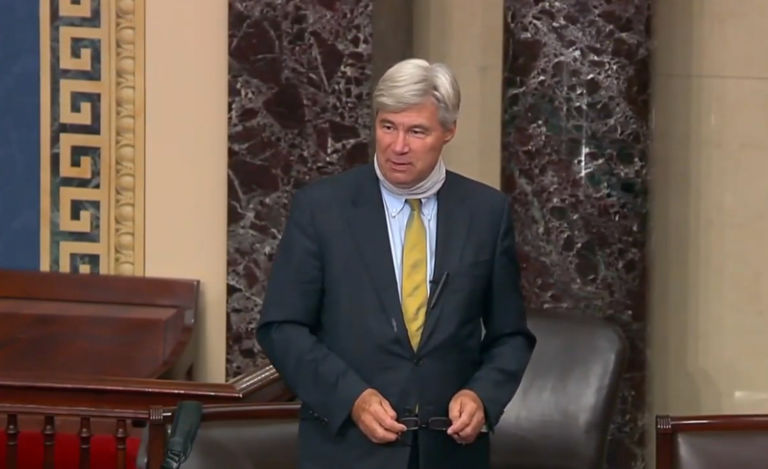My Spotlight report this week, "Not Written in Stone: How sunset laws can improve North Carolina’s regulatory climate," discusses the importance of sunset provisions to keep overregulation at bay. Since sunset provisions, including what is proposed in House Bill 74, would require rules slated for sunset to be readopted (H.B. 74 would have rules deemed "necessary with substantive public interest" go through the readoption process as new proposed rules), I argue for strong "sunrise" provisions to complement the sunset provision.
The following paragraphs featuring sunrise provisions for proposed new regulations are from my report:
REINS
The present structure of regulation in North Carolina is heavily biased toward expanding regulation. Procedural hurdles make successfully blocking a proposed rule extremely rare.
The REINS approach (from the "Regulations from the Executive In Need of Scrutiny" Act proposed before Congress) would require an affirming vote in the General Assembly before allowing to proceed any proposed rule that would have a major impact on the economy, cause significant cost or price increases on consumers, or bring about significant harm to competition, employment, productivity, and other healthy economic activities.
Strong cost/benefit analysis
[The Regulatory Reform Act of 2011] included a foundation of cost/benefit analysis but didn’t go far enough — it didn’t require agencies to reject rules if they find the costs of a proposed rule to exceed its benefits. An ideal regulatory process would have good, narrowly tailored rules adopted only when the rules are absolutely necessary, so a rejection requirement should not be twisted into an "adoption requirement" just because benefits are found to exceed costs. Furthermore, "benefits" are not benefits if they trespass individual rights, stand in as a measurable proxy for an immeasurable good (i.e., reduced carbon dioxide emissions assumed to mean a reduced global-warming risk), or are forced changes in behavior caused by mandates, etc.
Consideration of alternatives to regulation
An important reform in RRA 11 was to require an agency proposing a rule with substantial economic impact to consider at least two alternatives and explain why the alternatives were rejected.
In considering alternatives to rules, the agency should be required to include making no change as one of the alternatives to consider and quantify. (In the case of existing rules reviewed and deemed "necessary with substantive public interest," the alternatives should include no longer having the specific rule.) Agencies should be required to choose the least burdensome alternative.
Stated objectives and outcome measures
Any regulation, no matter how well conceived, poses a real risk of unintended, unforeseen negative consequences. Agencies should therefore be required to include stated objectives and outcome measures for regulations and state programs, so that when the time for review arrives, they can be held accountable to them. The "winners" of any regulation would be able to point to positive effects among themselves, so it is important to be able to test it according to its foundational purposes.
Requiring stated objectives and outcome measures up front is also an important feature of transparent government.
No-more-stringent laws
Given the burden of compliance costs of regulation, if North Carolina is to have a stricter regulation than that imposed by federal regulators, then it should be the elected representatives of the people (legislators), not agency bureaucrats, who make that decision. "No-more-stringent" laws would prohibit state agencies from imposing stricter regulations in areas also covered by federal regulations.
RRA 2011 addressed the lack of no-more-stringent laws in state environmental policy. The General Assembly should extend this reform to all state agencies, not just ones dealing with the environment.
No-more-stringent laws would not, however, prevent the legislature from passing stricter laws in areas covered by federal regulations. In that case it would be proper for directly accountable representatives of the people to make those decisions, not unelected, unaccountable bureaucrats.
Regulatory reciprocity, a.k.a. the "Stossel Rule"
Even if periodic review were in place, there would be no cap on the total stock of state regulation. An idea promoted by consumer reporter and Fox Business Network host John Stossel would require agencies to trade in old rules for every new rule.
If North Carolina were to adopt a form of the "Stossel Rule" — "For every new rule, repeal two old ones" — it would reduce the total number of regulations over time. A policy of regulatory reciprocity would also introduce opportunity cost to agency rulemaking, as agencies would have to consider the tradeoffs of creating a new rule. It could also lead to a voluntary speeding up of a periodic review if one were in place; i.e., an agency might face internal pressure not to wait the full ten years to report its "unnecessary" rules if identifying and culling them out now would clear the path for a new rule it considered necessary. (A rule readopted under periodic review would not count as a new rule for the purpose of regulatory reciprocity.)
To be the most effective, however, regulatory reciprocity should trade like rules for like. In other words, trading in two unnecessary minor rules for one major rule could have a net negative impact on the state’s economic climate, even though it would reduce the total number of rules. Therefore, a Stossel Rule approach for North Carolina would best require trading in old major rules if an agency wanted a new major rule.
Incidentally, regulatory reciprocity need not be limited to a "two-for-one" reciprocity arrangement. Stossel favored each new rule costing as much as 10 old rules.
Small business flexibility analysis
Small businesses comprise 98 percent of employers in North Carolina, but they typically struggle with higher costs to comply with state and federal regulations because unlike big firms, they generally lack their own compliance and legal staffs. Recognizing this cost disparity, the federal government has since 1980 used small business flexibility analysis, which offers small businesses less stringent compliance and reporting requirements, less onerous scheduling or reporting deadlines, use of performance standards rather than design or operational standards, and exemption from some or all requirements of particular regulations. A majority of states have adopted it as well.
Adopting small business flexibility analysis in North Carolina would not only help protect small businesses trying to comply with state regulations, but it would also extend to them protections afforded their peers in many other states.
Click here for the Rights & Regulation Update archive.


